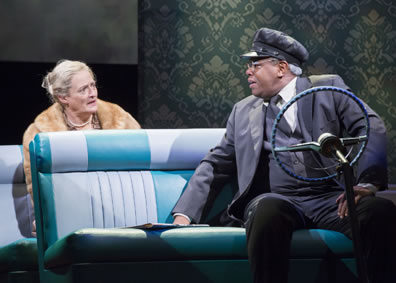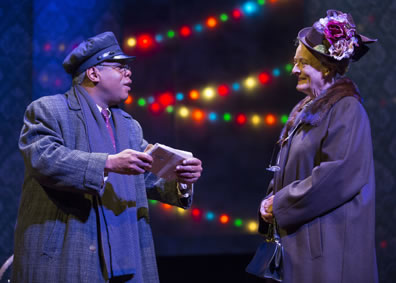Driving Miss Daisy
Time Passages
By Alfred Uhry
Ford's Theatre Society, Ford's Theatre, Washington, D.C.
Thursday, October 23, 2014, G–2&4 (Orchestra Right)
Directed by Jennifer L. Nelson

Nancy Robinette as Daisy and Craig Wallace as Hoke in Alfred Uhry's Driving Miss Daisy at Ford's Theatre. Photo by Scott Suchman, Ford's Theatre Society.
A synagogue has been bombed in one scene, Martin Luther King Jr. factors into another scene, and both main characters have to endure the effects of racial and religious prejudice. Yet one of the most important lines in Alfred Uhry's Pulitzer Prize–winning play Driving Miss Daisy comes near the end when erstwhile chauffeur Hoke remarks that his granddaughter now drives him around. Boolie (Tom Heneghan), his employer, is shocked. "My Lord, is she old enough to drive?" "Michelle's 37," Hoke (Craig Wallace) replies matter-of-factly: "Teaches biology at Spelman College." "I never knew that," Boolie says, realizing perhaps how little attention he paid to the life of the black man who has been driving his white Jewish mother around the past 25 years. We, at the same moment, like Boolie, realize how far we've come in so little time.
As presented in this Jennifer L. Nelson–directed production at Ford's Theatre in Washington, D.C., Driving Miss Daisy washes over you like memory. Over the course of its 1:20 run time, without an intermission, it covers the epochal years of 1948 to 1973, when Atlanta, the play's setting, transitioned inexorably from the Old South and segregation to integration and the capital of a commercially and politically powerful New South. Yet, told in vignettes, Driving Miss Daisy plays like a series of fond recollections—even things that were unpleasant at the time now give us cause to chuckle. Remember back in '48 when Daisy totaled the Packard? That's when her son, Boolie, hired Hoke to drive her around. Oh, but she was stubborn, tried everything she could to get him fired. Just like she tried to do with that housekeeper, Idella. Yeah, but Hoke and Daisy started getting along good; Hoke even came to the Christmas parties that Boolie's wife, Florine, used to throw. And then Hoke drove Daisy to Mobile that one time and they got lost. That was back when blacks weren't allowed in gas station restrooms, remember. And Jews were attacked, too, for supporting Civil Rights. That's right, it was Daisy, not Hoke, who went to the Martin Luther King tribute dinner. Weren't those tickets for Boolie, though? And look where he is now, big player in the Republican Party. And Daisy is out in the nursing home, her place put up for sale. And what about Hoke? What's he up to? Oh, he's still around, I reckon. Mmm-hmm, time sure passes, doesn't it? Look how much has changed! Look how much we change. You're right about that.
I've not seen the Oscar-winning film version of Driving Miss Daisy (the movie won for Best Picture, Jessica Tandy won for lead actress, and Uhry won for the screenplay), nor had I read the play before walking into Ford's Theatre. I intentionally wanted to watch this American classic as a novice. I'm a Southerner by heritage and a student of the Civil Rights Movement, so I was expecting to see a parable on racial relations. Instead, I saw ordinary American lives. The personalities and the cultural backdrops differ, but life experience follows a similar arc for most of us. "There are many locales," Uhry's stage directions say, but, "The scenery is meant to be simple and evocative." Scene Designer Tony Cisek has three panels that look like stately city home walls, classically papered and topped with crown molding, hanging above a bare stage with unpretentious columns to the sides. Daisy's kitchen and Boolie's office roll in and out on platforms as do the cars in which Hoke ferries Daisy to the Piggly Wiggly, the synagogue, Florine's Christmas party, Mobile, and the King dinner. You can see time subtly passing by via the upholstery in those cars, Costume Designer Helen Huang's simple but evolving fashions (evolving most on Boolie), and the soundtrack, moving from big band jazz through Delta blues, Fats Domino, and Buffalo Springfield.
Appropriately downplaying the setting and costumes keeps the focus on the people, not on the place—not that these actors have any difficulty being noticed. Not content on merely letting the iconic title supplement the tourist traffic to the theater, the Ford's Theatre Society cast two well-known D.C. theater veterans, Nancy Robinette and Wallace, in the roles of Daisy Werthan and Hoke Coleburn. Robinette is the quality of actress who can face up to Tandy in an iconic role and hold her own, and she plays Daisy with the steely reserve of an eagle who thinks she's a songbird caught in a cage. Wallace is one of the city's great Shakespeareans, an actor who never met a role he couldn't muscle into his own. Surprisingly, he molds Hoke around his sweet self, glomming on the character's background, growing up on a hog farm and driving for a dairy, to give us an easy-going but country-savvy fellow with unassuming pride. Heneghan matches talents with the two stars in the role of Boolie Werthan, Daisy's son whom we see maturing physically right before our eyes (what changes nature bestows upon us between 40 and 65) but always maintaining to the end a steady humorous nature and moral compass—though its needle quivers.
Uhry's play isn't so much intent on making moral declarations as it is about portraying people living through change, both personal and social. When he pokes at a social boil, it's human nature of a different color that oozes forth; yet, when he scratches a comedic itch of human foible, it festers into a dramatic moment of social conscience. The trip to Mobile starts with a running joke of how Daisy insists that "leaving by fifteen to eight" really means seven; but they miss a turn, and their subsequent tardiness means not only her missing dinner, but Hoke contending with having to relieve himself in the Alabama countryside. After Daisy scores tickets for the King dinner but Boolie declines to attend, suggesting that Hoke use the extra ticket, Daisy's pride and prejudice intervenes; she can't bring herself to inviting Hoke to join her in such a public event, but she uses the excuse that, Hoke being black, has ready access to King (Hoke has seen him preach "Same way as you—over the TV"). So she tries to get Hoke to invite himself, but her obvious duplicity turns him sour. "Next time you ask me someplace, ask me regular," he says. This is no longer a matter of race; it's two people coming to terms with their relationship, and sometimes that means turning down an angry alley.
The racism in this play flows like a cultural current. What we consider racial epithets abound, especially early on, but they are merely part of the local Atlanta dialect and group think, and nobody uses them any more than Hoke. Boolie gives in to latent racism by avoiding the King dinner, but his argument is purely one of economic logic; not only does he pay Hoke well and treat him respectfully from first to last, he continues paying Hoke "as long as you're there to get it," though he hadn't been driving Miss Daisy for several years (voluntarily providing Hoke a pension; even Daisy terms the arrangement highway robbery). "I'm not prejudiced" Daisy repeats, but of course she is; it's human nature. However, she refuses to acknowledge prejudice even when it is aimed at her. Prejudice is an unreality in her reality, although her reality is really an unreality. When her prejudice is put to a real test—and she fails—what we learn is not that she was wrong about assuming; she just assumes too much.
Hoke has no delusions about the society he lives in and his place in it. In the segregated South, there were parallel social orders and mutual economies, and Hoke navigates them as a de facto matter of existence. "Well, Mist' Wirthan, you try bein' me and looking for work," the 60-year-old Hoke tells Boolie in their initial job interview. "They hirin' young if they hirin' colored, an' they ain' even hirin' much young, seems like." However, we learn in the scene of the temple bombing, when Daisy comes face to face for the first time with being a victim of prejudice, that Hoke is carrying the deepest scar of racism. He describes the horrible image of a lynching (all the more horrible for those who know exactly what was done in lynchings). Yet to Hoke, it seems no more a defining scar of his character than I'm defined by the scars on my feet, elbow, wrist, and forehead; they don't affect the way I walk, work, write, or think, but because of those scars, I never again played baseball barefoot, jumped into a pile of debris, or faced down an angry cat, and I am more diligent about using sunscreen and getting annual skin checkups. Such are Hoke's psychological scars, though what he experienced as a young boy was searingly horrifying; you learn, you live.

Daisy (Nancy Robinette) gives Hoke (Craig Wallace) a Christmas gift in Driving Miss Daisy at Ford's Theatre. Photo by Scott Suchman, Ford's Theatre Society.
Daisy, on the other hand, cages herself in her past. She dwells on what it was like growing up in poverty and still defines herself as a fifth-grade teacher when, in fact, she's a wealthy widow with high society connections. So worried about seeming pretentious, she falls victim to her own prejudices. She doesn't like having the black housekeeper, Idella, in her home, and she certainly doesn't want to be seen being chauffeured around town by a "colored man." She attacks both via Boolie with accusations of robbing her. But in one of the play's funniest scenes, Hoke unwittingly undercuts her accusations, and in one of the play's tenderest scenes, Daisy and Hoke sit at the kitchen table drinking coffee reminiscing about the now-deceased Idella (a character, like Florine and Hoke's granddaughter, we never see). "We ain' had good coffee roun' heah since Idella pass," Hoke says. "You're right," Daisy replies. "I can fix her biscuits and you can fry her chicken, but nobody can make Idella's coffee. I wonder how she did it." If not visually, at least verbally we are seeing in this scene the essence of a mutually sustaining community unit.
Such scenes—attending the family Christmas party together, Daisy teaching Hoke how to read, Hoke earning his raise—alternate with the scenes of the Mobile trip and the King dinner to illustrate the ups and downs of any long relationship, especially between two people who come from two vastly different socio-economic spheres, and between two people who begin in a business structure but evolve into something of a family. The play's poignant ending has the lights going down on Hoke feeding Daisy her "Thanksgiving pie" at the nursing home. Time has passed; these two people have traveled that distance with and through each other, and here they are now, still relying on each other for happiness and sustenance.
Eric Minton
October 27, 2014
Comment: e-mail editorial@shakespeareances.com
Start a discussion in the Bardroom



 Find additional Shakespeareances
Find additional Shakespeareances